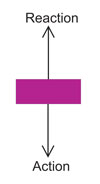|
Newton's third law of
motion states as follows:
To every action
there is an equal and opposite reaction.
The reality of
Newton's third law of motion can be seen in the following instances:
- An object
placed on a table. There are two forces acting
in opposite direction on the object.
One, is the Action of
the object on the table. This is the weight of the object pressing down on the
table.
The other is the
Reaction of the table on the object. This force acts vertically upward on the
object.
These two forces,
i.e., the Action and the Reaction forces are both equal in magnitude, but act in
opposite direction.

- A moving ball
that hits a stationary one. If a moving ball, A
makes contact with another, B, which is at rest, there will also be two
opposite and equal forces at play.
One is the force of A
on B, which is the Action, and the other is the Reaction of B on A, which is
equal in magnitude to A, but in opposite direction.
- When someone
fires a gun. As the bullet is fired, the person
would experience a backward force as the gun recoils.
The force
that acts and moves the bullet forward is the Action, while the backward recoil
force of the gun is the Reaction.
Both forces are equal
in magnitude and move in opposite direction.
Something to note:
For the fact that
force is proportional to rate of change in momentum, as expressed in Newton's
Second Law Of Motion, it therefore follows that the momentum of the bullet
is equal to the momentum of the gun.
Therefore, if M is
the mass of the gun with velocity V backward, and m is the mass of the bullet
with velocity v forward, a mathematical equation can be established:
MV = mv
Application Of
Newton's Third Law Of Motion - the movement of jet planes and rockets
A very important
practical application of Newton's third law of motion is the transportation of
jet planes and rockets.
The movement of both
planes and rockets is made possible by large mass of hot gases gushing out from
the nozzle behind them.
As the gases pump out
with enormous momentum, considering the huge velocity and mass per second of the
gases, there is also an equal momentum in the opposite direction, which thrust
the jet plane or rocket forward at great speed.

A rocket
propelled forward by the momentum its burning fuel gas generates - the
burning gas gushes out downwards.
(Picture from
http://www.defenseindustrydaily.com
See calculation of force based on Newton's third law
of motion here.
|